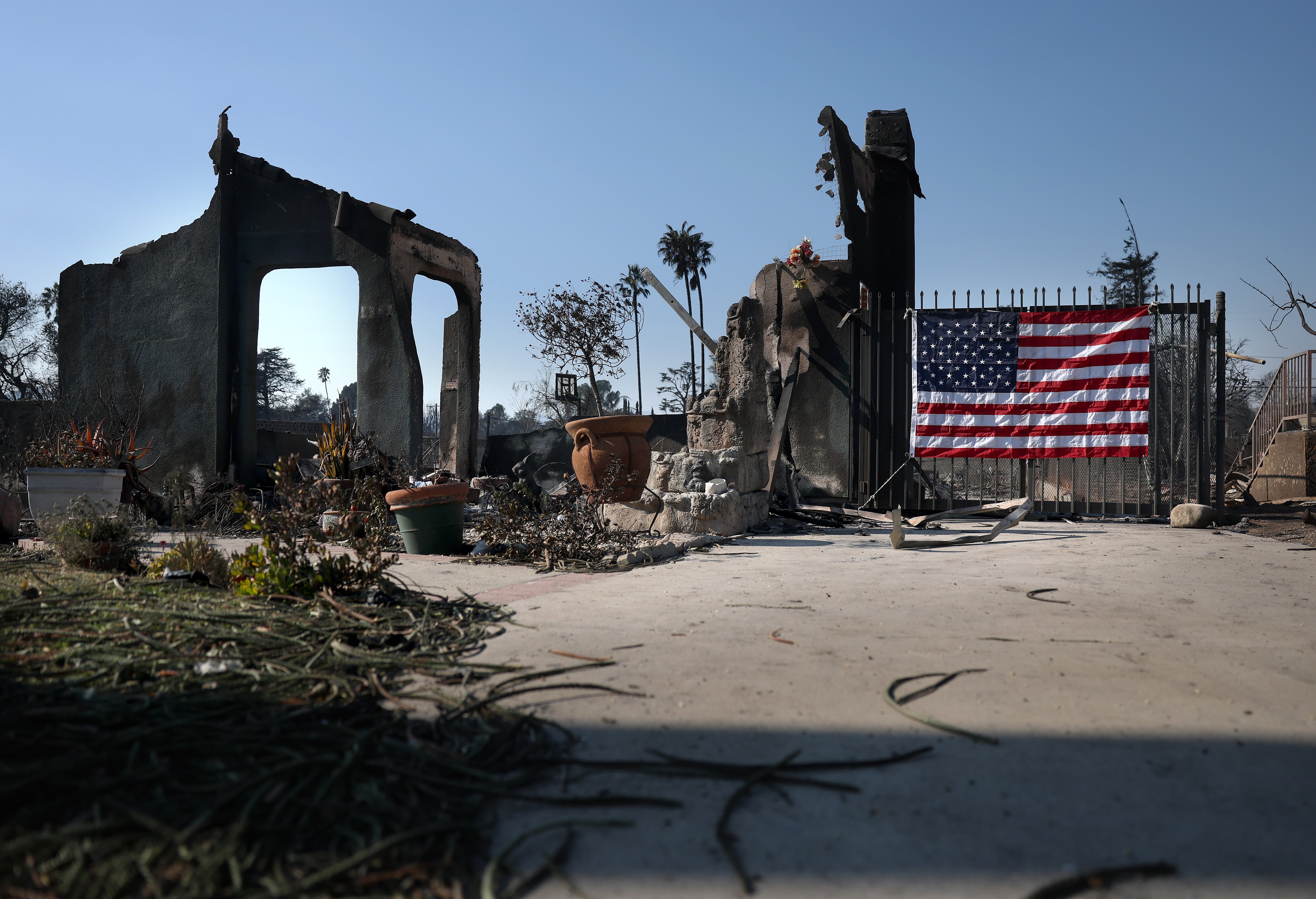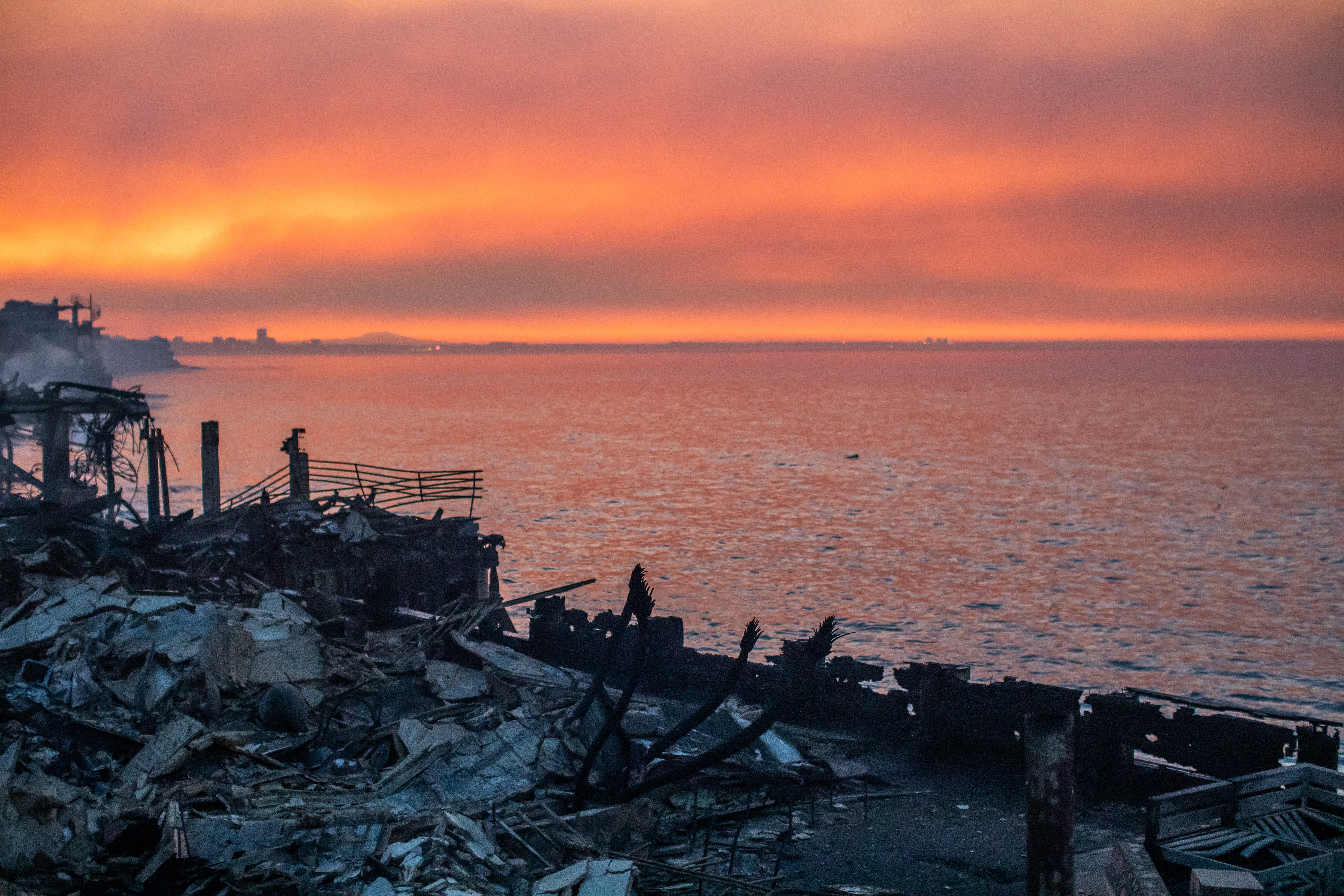A homeowner in one of the sections hit hardest by the wildfires rampaging through Los Angeles since Tuesday is refusing to leave her residence — violating a mandatory evacuation order issued by authorities — because, while her house is still standing, she’s afraid of losing everything inside of it to looters.
The Eaton fire has burned through some 14,000 acres of the area, sparing her home, which she chalked up to “an act of God.” But although she is feeling emotionally drained and more than a little overwhelmed, the veteran ER nurse counts herself among the lucky ones.
“We were able to survive, but what’s left of the neighborhood looks like a nuclear bomb went off,” she told The Independent. “Streets with no houses.”
On Friday, the 62-year-old said she has been camped out at her two-bedroom Craftsman after seeing news reports that roving bands of thieves are targeting homes that weren’t leveled and remain unoccupied in evacuation zones around the city. The fires have so far claimed 10 lives, and have destroyed thousands of homes and businesses over the past four days.
She asked that her name not be used, as ignoring mandatory evacuation orders is a criminal offense under California law, with the possibility of steep fines and even jail time for offenders. Although rarely enforced, the Pasadena-area resident said she fears not only prosecution but also losing her job.
“Somebody went and broke into a house that’s still standing, there’s no power at night, it’s pitch-dark… it’s like a ghost town,” she said.

Unlike the moneyed enclave of Pacific Palisades, where the median home price is an eye-watering $3.3 million and wealthy residents have hired private security to guard their properties, the ER nurse said that’s not happening in her area.
“No one’s here securing the homes, so these criminals are coming and breaking in,” she said. “Just to add more insult to injury, we have that now. So I’m living in my house right now, with a generator, even though we’re supposed to be evacuated, and basically camping here so we can protect our home and assets. Because the crime is a problem. Nothing here is good.”
As of Friday, police have arrested at least 20 people for looting in wildfire zones.
The woman’s elderly mother and father, who live nearby, evacuated their home, which also survived. They are staying with her until they can return to their place, which, after more than a half-century, they own outright. However, it has been uninsured since a prior wildfire prompted their insurance company to cancel their coverage. This, she said, outrages her, and called the situation “a f***ing crime.”
“What gives them the right to just abandon people at the drop of a hat?” she seethed. “… As a nurse, I would love my license for abandoning a patient… In today’s society, the only thing you can do is have money. And there’s not enough money.”

Several insurers no longer write homeowner policies in California, citing wildfires as too much of a risk to protect against. The insured losses stemming from this week’s fires are expected to approach $10 billion, a cost that will be borne by the remaining private insurers in the state. For those who can’t obtain coverage in regular insurance markets, the State of California, as the insurer of last resort, writes extremely costly homeowner policies that provide an attenuated level of coverage.
Homeowners with a mortgage are required by lenders to be insured, according to Cornelissen. Those who inherited a home, or bought one decades ago and are now retired, could own the property outright but remain cash-poor, according to Sharon Cornelissen, director of housing for the Consumer Federation of America.
In Metro Los Angeles, about five percent of homeowners have been forced to “go bare,” or do without insurance altogether, she told The Independent.
The Biden Administration has deemed the Southern California wildfires a declared disaster, which will allow affected homeowners to apply for FEMA assistance grants of up to $42,500 for repairs and an equivalent amount for essential household items, Cornelissen said. But, on average, homeowners in the past have received FEMA grants of a little over $3,500, according to a March 2024 report Cornelissen authored.

That means dipping into savings or retirement accounts, if possible, taking out loans, or abandoning a home altogether. Some rely on charity, or take shelter in a temporary trailer provided by the feds, she said. Many lean on family; others go from homeowner to home renter. In a worst case scenario, according to Cornelissen, uninsured homeowners can become homeless.
Beyond FEMA, there are other programs for the uninsured, and underinsured, to get back on their feet and rebuild after a serious loss, said Annie Barbour of United Policyholders, a California nonprofit that helps policyholders navigate the byzantine insurance system. Those affected are also eligible for tax breaks, which can go a long way in trying to finance a major reconstruction.
“If you are without insurance, it will be a struggle,” Barbour told The Independent. “But this is a declared disaster with federal assistance, so people can piece together a rebuild. The hardest thing for a survivor to do is to accept help. They need to say ‘yes,’ right now.”
At a press briefing on Thursday, Sen. Adam Schiff (D-CA) said, “We’re not through this by any means. We may see more fires before this is over. But we will get through this. We will rebuild our neighborhoods, our schools, and our communities.”




